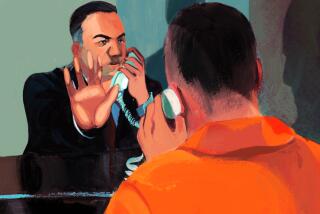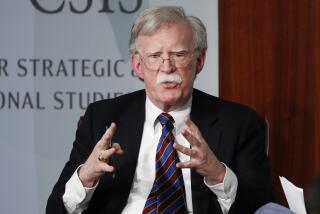FBI Agent Says Moussaoui Was Looking to Make a Deal
- Share via
ALEXANDRIA, Va. — In another twist to an already bizarre case, the last witness in the Zacarias Moussaoui trial Tuesday described a secret, late-night jailhouse meeting in February where he said Moussaoui tried to strike a deal with prosecutors to cooperate with the government in order to save his life.
FBI Special Agent James Fitzgerald, one of the lead agents in the case, said Moussaoui summoned him and federal prosecutors to the Alexandria city jail in an attempt to persuade them that he was worth more to them alive than dead.
But the bargaining in the jail law library on Feb. 6, a month before Moussaoui’s trial began, broke down when prosecutors demanded that Moussaoui provide “full and complete” cooperation and tell everything he knew about Al Qaeda, not just his role in the Sept. 11 conspiracy.
Fitzgerald testified that Moussaoui came away from the clandestine meeting empty-handed.
Though Moussaoui’s lawyers have said he wants to die a martyr, he told the FBI and prosecutors that death in a prison execution chamber was not a fitting end for an avowed terrorist such as himself.
“He stated it was different to die in battle like an F-16 pilot,” Fitzgerald said, “than to die in jail like in a toilet.”
Fitzgerald was the concluding witness in a trial full of surprises.
A government aviation lawyer was accused of improperly tampering with witnesses, prompting the judge to exclude all but one aviation expert from testifying and nearly gutting the government’s case.
Then Moussaoui returned the favor: Taking the stand in his own defense, he said he was supposed to fly a fifth plane into the White House on Sept. 11, and admitted the government’s chief allegation -- that he had lied to the FBI after his arrest in August 2001 so the terrorist plot could go forward.
Today, lawyers for both sides are to make closing arguments. Jurors will then begin deliberations.
Moussaoui pleaded guilty in April. The jury’s first task in the sentencing phase is to decide if prosecutors proved that Moussaoui, a 37-year-old student pilot from France, is eligible for the death penalty.
The government contends he is because his failure to cooperate with the FBI in the weeks leading up to the attacks prevented agents from stopping the airplane hijackings.
If all 12 jurors side with prosecutors, the trial will move to a second phase to decide whether Moussaoui will be executed or spend the rest of his life in prison with no chance of parole. If jurors do not, the trial will be over and Moussaoui will automatically be sentenced to life.
Earlier Tuesday, defense lawyers played videos of Bush administration officials testifying before the Sept. 11 Commission in 2004, in which they admitted numerous lapses in the federal law enforcement network during the summer of 2001. The defense argues that government ineptness, not Moussaoui’s secrecy, prevented agents from uncovering the plot.
Moussaoui’s lawyers also had summaries of testimony read to the jury from several Al Qaeda leaders confined outside the country. They generally described Moussaoui as an unreliable member of Al Qaeda, and contradicted his claim that he was to fly a plane into the White House or to play any other role on Sept. 11.
One spoke of an odd plot that Moussaoui was trying to develop in Malaysia involving a truck bomb made from as much as 40 pounds of ammonium nitrate.
“Moussaoui was very troubled; he was not right in the head,” said Encep Nurjaman, a Southeast Asian operative better known as Hambali.
He said terrorists in Malaysia purchased four pounds of the fertilizer, and were stuck with the bill when Moussaoui abruptly left Southeast Asia and eventually made his way to the United States and flight school.
But Fitzgerald stole the day when he testified as the government’s single rebuttal witness. He described the jailhouse negotiations with Moussaoui as a “low-key, quiet and civil meeting.” Moussaoui opened the session by saying he wanted to testify in his trial -- but as a government witness.
At the time, and even up until he took the stand Monday, his court-appointed lawyers had repeatedly pleaded with him not to testify. They even urged the judge not to allow it.
Moussaoui, clearly worried that his lawyers would block his chance to testify, was turning to the FBI and prosecutors for help. Fitzgerald said Moussaoui pledged to tell them and the jury everything he had done to advance the Sept. 11 plot.
It was at that meeting, Fitzgerald said, that Moussaoui first claimed that he was to pilot a fifth plane on Sept. 11 and fly it into the White House.
But the agent said the terrorist had declined to answer follow-up questions and flatly refused to give them broader information about the inner workings of Al Qaeda.
With that, Fitzgerald said, the talks fell through.
More to Read
Sign up for Essential California
The most important California stories and recommendations in your inbox every morning.
You may occasionally receive promotional content from the Los Angeles Times.











